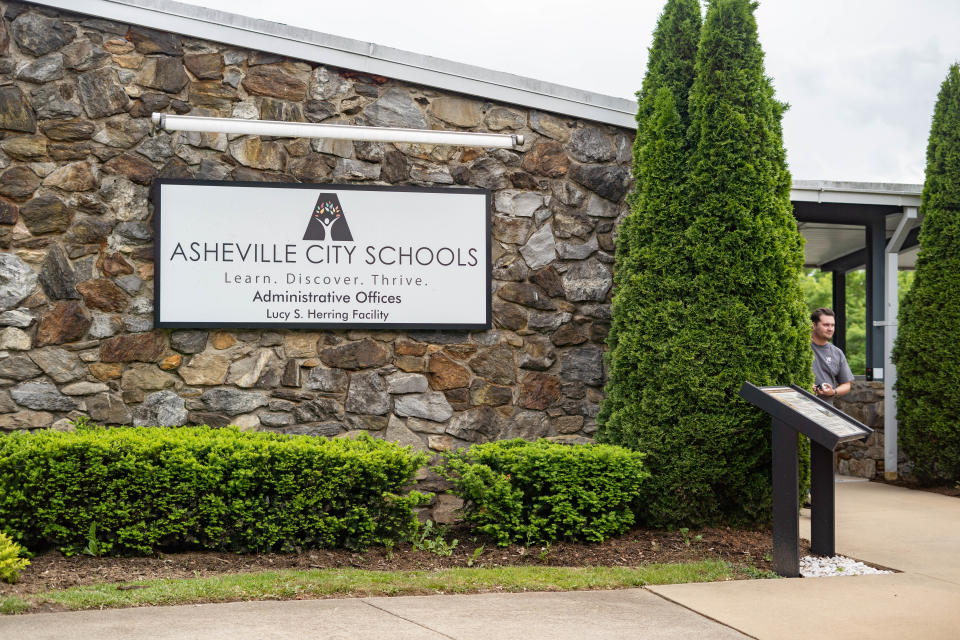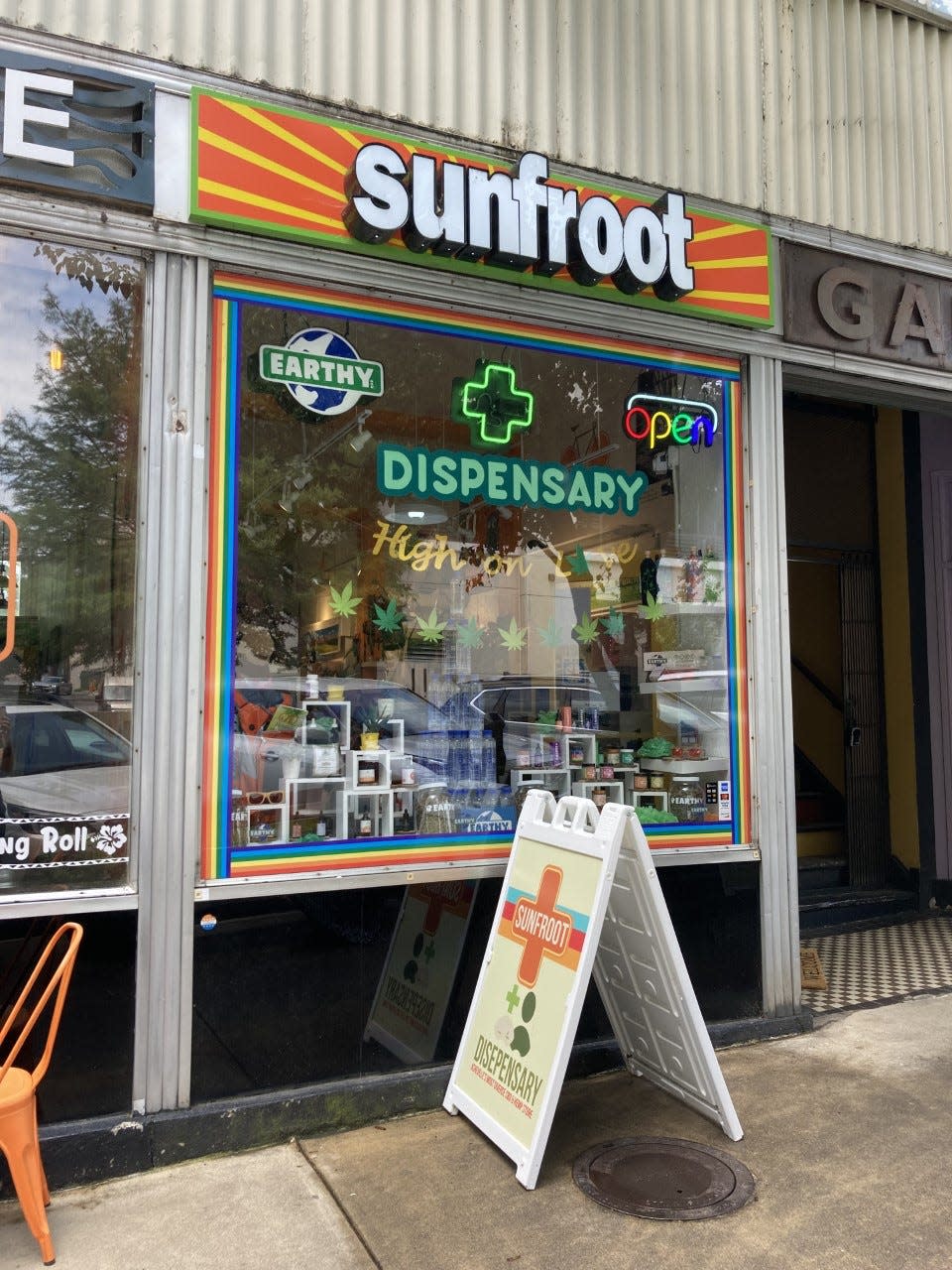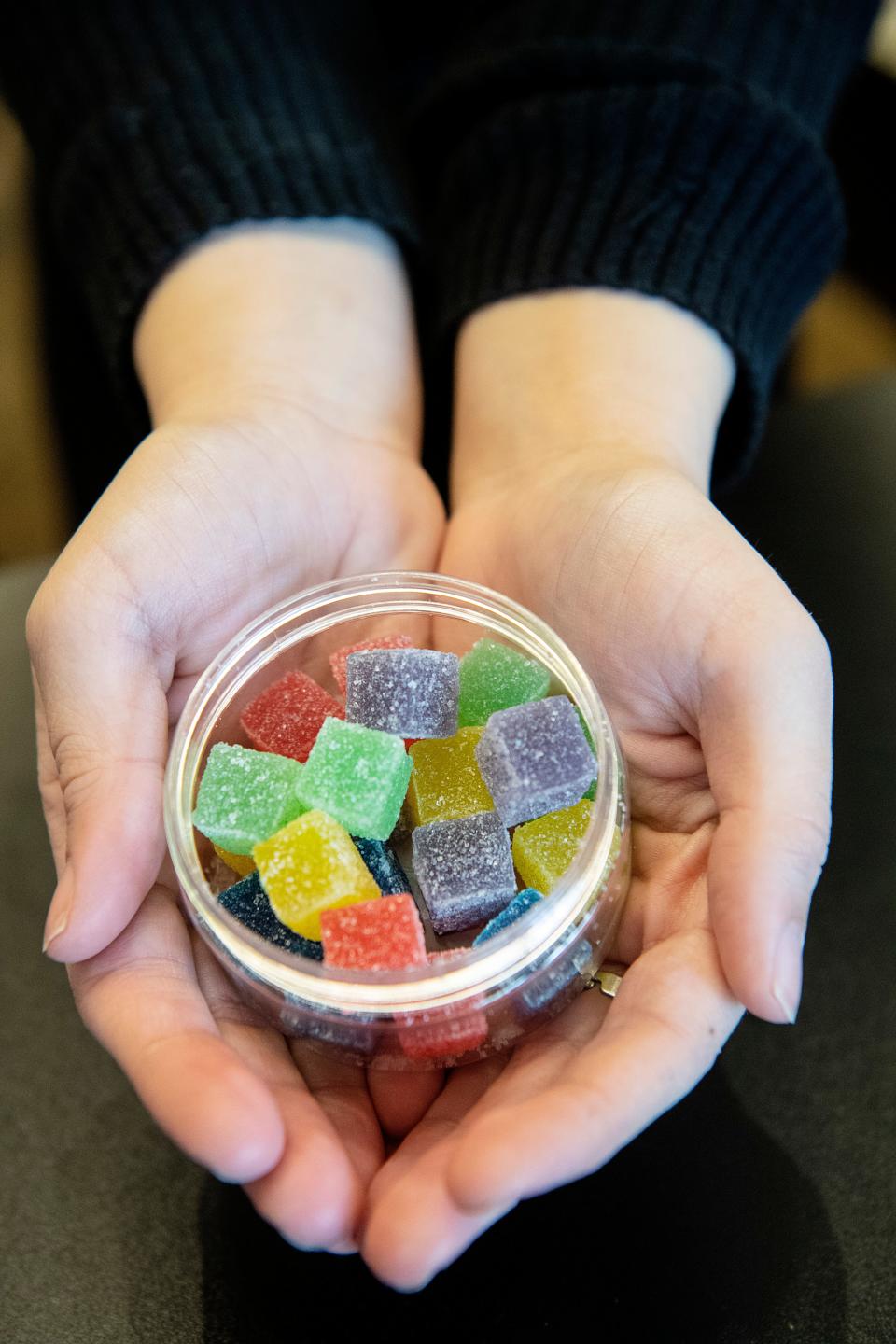Parents still purchase CBD for kids almost a year after Asheville City Schools restriction
ASHEVILLE - CBD is once again banned in Asheville City Schools, quietly prohibited for students in the midst of the pandemic, but some parents are still buying CBD for their school-aged children as alternative medicine.
ACS made headlines in May 2020 when it removed CBD, the chemical compound found in cannabis, from its list of prohibited substances, a break from the surrounding school districts of Buncombe, Henderson and Transylvania counties and from the North Carolina School Board Association's recommendations. CBD has not made its way back to the city school district's prohibited substances list but is restricted through a policy on administering medicines to students.
Franny Tacy, owner of the CBD company Franny’s Farmacy, said the policy change was one of politics, not science.
"I don't know when it definitely happened, but I know that ever since they approved it, it had been up to be revoked many times because it was pretty controversial," she said. "Fortunately, it's not controversial with the children or the parents that are using it."
Older people and parents buying for their children are the two biggest customers her dispensaries see, Tacy said, and these people aren't using CBD to get high ― a common misconception ― but are using it as alternative medicine.
CBD gets reprieve: Legislation gets final OK that keeps legal NC hemp production, sale
Previously:CBD supporters anxious for hemp legality: 'It is time for us to be progressive in cannabis'
Legal CBD is created using hemp, a plant in the cannabis family that is different from marijuana because of its relatively low amount of tetrahydrocannabinol, or THC, the compound in marijuana that produces the "high" the drug is known for, according to the CDC.

"The largest consumers of that product now are the elderly that are on medications and children. We sell a lot of products to adults over age 21 that are buying it for that purpose. It's for their children that are still in school. I know it's being used. I don't know how it's being administered," Tacy said. "Multiple dozens of customers a week see us and are taking the health of their child into their own hands and using CBD."
Sara Shea, an Asheville parent, said she gives her daughter CBD to help keep her calm and reduce episodes of headbanging and mild repetitive self-injury that come as a result of her Wiedemann-Steiner Syndrome, a rare genetic disorder. Many of the specialists Shea's daughter sees, such as geneticists and doctors, have recommended CBD oil to her, she said.
"I never told the school I was giving it to her. So I have no idea what they would think. And I don’t really care," Shea said via Facebook message on Oct. 3.
Shea has largely refrained from giving her daughter any prescription medication, she said, except for growth hormone therapy needed because she does not produce normal levels of growth hormones due to her rare syndrome. For all other occasions, Shea sticks to CBD and melatonin.
"I’m a huge advocate of CBD. I have seen it really help my daughter," she said. "I also definitely enjoy CBD and hemp products because they help me to relax and fall asleep at night, but I think CBD is critical for children with self-injurious behavior."
Tacy said Franny’s Farmacy only sells to people 21 and older. Clover CBD, another Asheville dispensary, does not sell to anyone under 18 and does not encourage customers to give CBD to their children, Assistant Manager Trevor Schmidt said.
"Of course, we never condone breaking any laws or not complying with state or local rules/regulations. However, if a child has a medical condition, like epilepsy, and their parents decide to give them CBD, we are not in a position to judge," Schmidt said in a Oct. 3 email. "When discussing CBD/hemp with customers in general, we are very careful about what information we share, since we are not medical professionals, nor are we qualified to make medical recommendations. That means we often recommend that customers discuss their questions or concerns with their doctor/pediatrician/etc."
Reporting from the Citizen Times in 2020 shows that then-ACS administration and Board of Public Education made the decision to not restrict CBD because of its use as an alternative medicine and medical supplement, two uses now prohibited under the current policy.
This policy states that the administration to students either by parents, school staff or self-administration "of any substance containing cannabidiol (CBD) or tetrahydrocannabinol (THC) at school is prohibited," unless given by a caregiver for epilepsy or the product is available by prescription only and has been approved by the U.S. Food and Drug Administration.

On Nov. 8, 2021, the Asheville City Board of Education approved the policy change in a consent agenda vote, a single motion and vote typically reserved for multiple routine, non-controversial items that do not require discussion. All policy changes are discussed in board work sessions, then approved through consent agenda votes at board meetings. The change was discovered by the Citizen Times on Sept. 29 when ACS spokesperson Dillon Huffman was asked if there had been any efforts to try to add CBD back to the prohibited substance list.
Tacy held discussions in her dispensaries about the future of CBD in schools after it was removed from the prohibited substances list, bringing together parents and health care professionals. But she stopped these meetings due to upset parents, often in divided families, she said.
"I know what these parents were going through, and a lot of it was, you know, mom versus dad. It has nothing to do about the well-being of the child," she said.
While all evidence points to CBD being safe for children, with the amount of unregulated CBD on the market, it makes sense that schools would want to restrict students from using it at school, Schmidt said. Clover CBD independently tests and conducts research on all its products, he said, but not all businesses selling CBD products do.
"I could envision a scenario where a child takes CBD gummies to school and they take 10 or more of them to feel a high (because most CBD products are full-spectrum with trace amounts of THC) or worse, they get some sketchy product from a questionable source and are unknowingly ingesting not-CBD at school and potentially sharing with other children," Schmidt said in a Sept. 30 email to the Citizen Times.
Limiting CBD at schools also makes sense, he said, because CBD can last for about six to eight hours, meaning "any child taking CBD can do so at home, under the supervision of parents, before and after school."
ACS made the decision to change the medicine administration policy and restrict CBD "to more closely align with the N.C. School Board Association's policy," Huffman said in a Sept. 30 email.
“This is going to be monumental,” Tacy told the Citizen Times when ACS voted to allow CBD in May 2020. "What they need is one district to do it and set the example.”
Buncombe County Schools restricts CBD through its drug and alcohol policy, but only for students. Transylvania County Schools restricts CBD for both students and employees through drug policies and its medicine administration policy. Henderson County Schools no longer specifically mentions CBD in its policies.
Buncombe and Transylvania's policies, because they prohibit drugs and alcohol, restrict students from taking or being under the influence of the substances they restrict. ACS's policy does not restrict students from being under the influence of CBD, only taking it during school hours.
According to Christine Scheef, legal counsel and director of policy for the NCSBA, the organization recommends school districts prohibit CBD in its policies.
"NCSBA made changes to its model policy manual in 2019, in the wake of changes to federal and state law that effectively legalized CBD if it is derived from hemp. However, there are practical difficulties in distinguishing between legal and illegal CBD," Scheef said in an email.
Previous coverage:Jones Park playground: ACS board approves rebuilding; City Council up next
In other news:Mission Hospital paying $1.2M less in taxes after valuation talks; city schools lose out
Asheville Board of Education members did not immediately respond to a request for comment.

CBD legality and regulation
To qualify as hemp or as a hemp product, the plant material or the product itself must contain no more than 0.3% delta-9 THC on a dry weight basis, according to Tyler Russell, co-chair of the Asheville-based law firm Ward and Smith's hemp and cannabis practice group.
Hemp has been legal in North Carolina since 2015, but faced legal challenges in June when the law temporally making hemp legal was set to expire without a replacement. On June 30, Gov. Roy Cooper signed a bill making state and federal laws consistent on hemp and ensuring a future for the industry in North Carolina.
North Carolina laws do not restrict the sale of CBD to minors, but Russell said the best practice for sellers of CBD or similar products is to limit sales to adults.
"Outside of a prescription drug context and the doctor-patient relationship, hemp businesses should not make, market, or sell hemp-derived products that are intended for use by minors or children," Russell said. "It is irresponsible to do so and would invite scrutiny from the FDA and other federal agencies, it opens the door to many risks and liability issues and it subjects the industry as a whole to potential negative backlash that no one wants to see."The FDA has approved only one cannabis-derived and three cannabis-related drug products to date, and none contain CBD.
"We are aware that some firms are marketing CBD products to treat diseases or for other therapeutic uses, and we have issued several warning letters to such firms. Under the FD&C Act, any product intended to have a therapeutic or medical use, and any product (other than a food) that is intended to affect the structure or function of the body of humans or animals, is a drug," the FDA's website says. "FDA continues to be concerned at the proliferation of products asserting to contain CBD that are marketed for therapeutic or medical uses although they have not been approved by FDA."
Christian Smith is the general assignment reporter for the Asheville Citizen Times. Questions or Comments? Contact him at RCSmith@gannett.com or (828) 274-2222.
This article originally appeared on Asheville Citizen Times: Some Asheville parents still buy CBD for kids after school restriction
